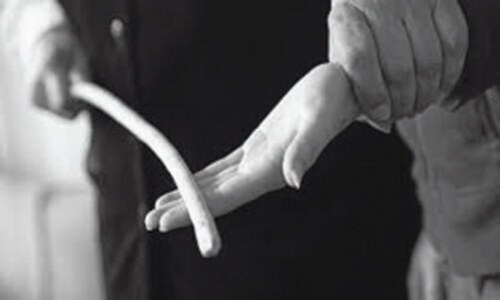ISLAMABAD: The Senate Standing Committee on Interior on Monday passed the Islamabad Capital Territory Prohibition of Corporal Punishment Bill 2022 moved by Senator Walid Iqbal and Senator Sadia Abbasi.
The meeting of the committee, chaired by Senator Mohsin Aziz, was held at Parliament House and attended by Senators Rana Maqbool Ahmed, Moula Bux Chandio, Azam Nazeer Tarar, Rubina Khalid, Seemee Ezdi, Kamil Ali Agha, Saifullah Abro, Syed Yousuf Ali and others.
Last year on Dec 1, the parliament in its joint sitting had passed the law, but later some legal experts objected to its language, compelling the movers to introduce a new bill.
Senator Walid Iqbal informed the committee that the bill aimed at banning corporal punishment on children by declaring it a crime. The committee unanimously passed the bill after detailed deliberation.
FIA officials update lawmakers about progress on Arshad Sharif case
Senator Sadia Abbasi, while talking to Dawn, said currently there was a British era law under which there was room for the use of reasonable force against children.
“In educational institutions, corporal punishment was being used under the same law. However, during the tenure of the PTI, the Islamabad High Court (IHC) took notice and suggested legislation on it. Member National Assembly Mehnaz Akber Aziz had initially moved the bill and it was passed by the joint session of parliament,” she said.
She said Senator Walid Iqbal had objected to the language of the bill due to which it was again moved in the Senate.
“The bill suggests that there should be a proper mechanism to take action against teachers who punish children. Punitive action would be taken against such teachers,” she said.
Ms Abbasi said majority of people of her age had faced corporal punishments in schools, expressing the hope that soon the bill would be passed by the National Assembly.
Pakistan has ratified United Nations Convention on Rights of Child (1989) and in accordance with Article 19 of the convention, the government has committed to taking all appropriate legislative, administrative, social and educational measures to protect the child from all forms of physical or mental violence, injury or abuse, neglect or negligent treatment, maltreatment or exploitation.
Meanwhile, on the International Day to End Corporal Punishment observed this year, United Global Organisation of Development and National Action Coordination Group Pakistan in collaboration with Hashoo Foundation, National Commission on the Rights of Children (NCRC) and Ministry of Human Rights arranged an event outside the National Press Club.
Speaking on the occasion, Ali Haider, a student of Askariya School, had stated: “Children have consistently expressed the urgent need to stop all the violence. Children testify to the hurt – not only physical, but the ‘hurt inside’ – which this violence causes them compounded by adult acceptance, even approval of it.”
He said some people argued that it was okay to give a child a slap or one or two canes when they misbehaved. “But it is not OK just like it is not OK to do that to an adult,” he said.
Tajdar Hashmi (child member of NCRC) said prohibition was still to be achieved in the home, alternative care settings, daycare, some schools, some penal institutions and as a sentence for crime. Prohibition had been achieved in all settings in Gilgit-Baltistan.
Faryal Javed (child member of NCRC) said the Federal Directorate of Education (FDE) had already directed heads of all institutions to be vigilant against corporal punishment.
Mehwish Kayani (national coordinator NACG-Pakistan) said corporal punishment was physical punishment intended to cause physical pain to a person. It was often practiced on minors especially in home and school settings.
Arshad Sharif case
The FIA officials updated the Senate committee about the progress on Arshad Sharif killing case and said they were preparing a report based on the findings of the investigation team that had visited Kenya to collect evidence.
Law Minister Azam Nazeeer Tarar, however, said the matter was under consideration in the Supreme Court and, therefore, they should not discuss the matter and make any observation or comment.
Published in Dawn, November 29th, 2022











































